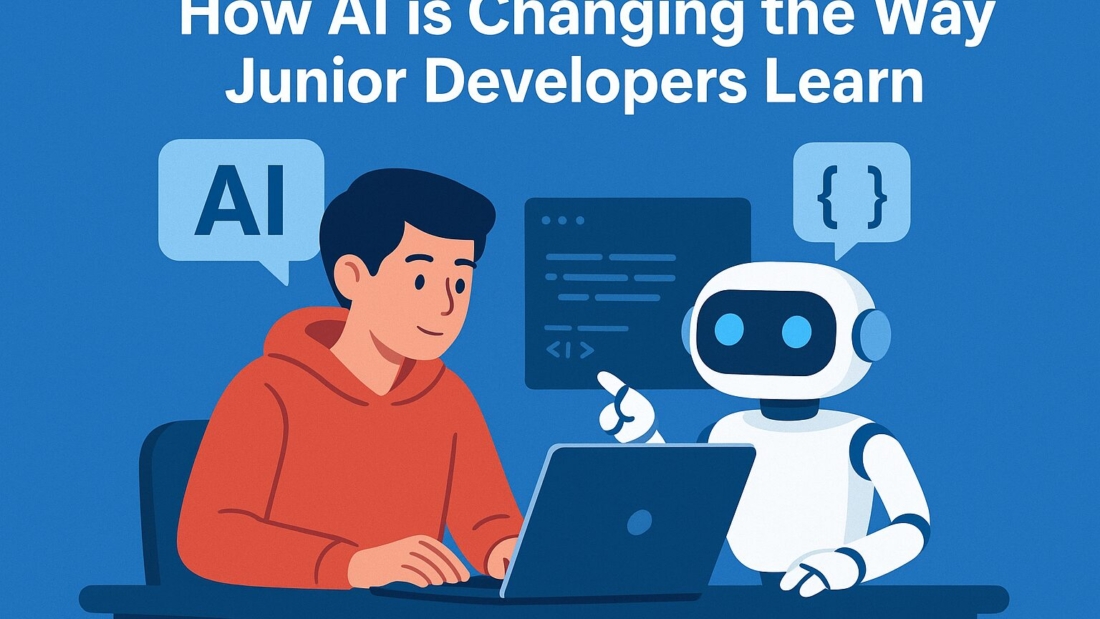The learning curve for junior developers has always been steep. Traditionally, they relied on coding bootcamps, online courses, documentation, and mentorship from senior developers to build their skills. While these methods are still valuable, the arrival of Artificial Intelligence (AI) has dramatically shifted how new developers acquire knowledge, solve problems, and gain real-world coding experience.
From personalized learning to on-demand coding assistance, AI is becoming a powerful ally for beginners entering the tech industry. Here’s how AI is reshaping the learning journey for junior developers.
1. Instant Code Assistance and Debugging
One of the biggest challenges junior developers face is understanding why their code isn’t working. In the past, this often meant hours of searching Stack Overflow or documentation. Now, AI-powered tools like GitHub Copilot, ChatGPT, and Tabnine provide instant, context-aware suggestions.
These tools don’t just offer solutions — they explain why the code works, helping beginners grasp the underlying concepts. This reduces frustration, speeds up the learning process, and encourages more experimentation.
2. Personalized Learning Paths
AI can analyze a developer’s strengths and weaknesses, then tailor learning resources accordingly. Platforms like CodeSignal, LeetCode, and Codecademy are beginning to integrate AI-based progress tracking, recommending exercises that address specific gaps.
For example, if a junior developer struggles with recursion, an AI learning assistant might generate custom practice problems and step-by-step guides until mastery is achieved. This level of personalization was previously only possible through one-on-one mentorship.
3. Real-Time Language and Framework Support
While burnout can’t be pinned to a single cause, common triggers in software development include:
Scope Creep – Continually adding features without adjusting timelines or resources.
Overtime Culture – Expecting late nights and weekend work as “normal.”
Poor Planning – Inadequate requirement gathering leading to rushed development phases.
Micromanagement – Limiting developer autonomy, which stifles creativity and motivation.
Tool Overload – Constantly switching between tools and technologies without sufficient training.
Preventing Burnout Before It Derails Delivery
AI can analyze a developer’s strengths and weaknesses, then tailor learning resources accordingly. Platforms like CodeSignal, LeetCode, and Codecademy are beginning to integrate AI-based progress tracking, recommending exercises that address specific gaps.
For example, if a junior developer struggles with recursion, an AI learning assistant might generate custom practice problems and step-by-step guides until mastery is achieved. This level of personalization was previously only possible through one-on-one mentorship.
3. Real-Time Language and Framework Support
Technology moves fast, and junior developers often struggle to keep up with new languages, frameworks, and libraries. AI tools can bridge this gap by offering real-time guidance in almost any programming language.
Whether you’re learning Python, JavaScript, Rust, or even niche frameworks, AI assistants can:
Explain syntax and concepts in plain language
Provide examples adapted to your current project
Suggest best practices and potential optimizations
This helps new developers stay relevant in an ever-changing industry without feeling overwhelmed.
4. Encouraging Hands-On Learning Through AI Projects
Instead of only reading tutorials, junior developers can now build AI-assisted projects early in their learning journey. For example:
Creating chatbots using natural language processing APIs
Developing small web apps with AI-powered backends
Automating repetitive tasks with AI scripts
These projects allow beginners to apply their skills to practical use cases, building confidence and improving their portfolios — something employers love to see.
5. Better Collaboration and Communication Skills
AI tools like code review bots and documentation assistants help junior developers understand why certain coding standards exist. They can receive feedback that’s detailed yet easy to understand, making code reviews less intimidating.
Additionally, AI can help translate technical jargon into simpler language, making it easier for juniors to communicate with non-technical stakeholders. This skill is essential in professional environments where collaboration between developers, designers, and business teams is common.
6. Reducing Knowledge Gaps in Remote Work Environments
Remote and hybrid work has made it harder for junior developers to receive in-person guidance. AI fills that gap by offering:
24/7 availability for questions
Interactive tutorials tailored to the current task
Step-by-step explanations without judgment
This allows juniors to keep learning at their own pace without waiting for the next team meeting or mentor availability.
7. Fostering a Growth Mindset
Perhaps the most transformative impact of AI on junior developers is the mindset shift it encourages. Instead of fearing mistakes, beginners can experiment freely knowing that AI will help them identify, understand, and correct errors.
When failures become learning opportunities rather than setbacks, developers grow more confident and resilient — traits that are invaluable in a tech career.
The Future of AI-Driven Learning for Developers
AI is not just another tool in a developer’s toolkit — it’s becoming a mentor, tutor, and collaborator rolled into one. For junior developers entering the field today, embracing AI means unlocking a faster, smarter, and more engaging way to learn coding skills.
The key is balance: use AI for guidance and practice, but also take time to think, explore, and build without it. After all, while AI can teach you how to code, it’s your human creativity and curiosity that will make you a great developer.
Final Thoughts
AI is not just another tool in a developer’s toolkit — it’s becoming a mentor, tutor, and collaborator rolled into one. For junior developers entering the field today, embracing AI means unlocking a faster, smarter, and more engaging way to learn coding skills.
The key is balance: use AI for guidance and practice, but also take time to think, explore, and build without it. After all, while AI can teach you how to code, it’s your human creativity and curiosity that will make you a great developer.

